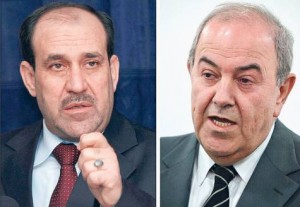
A coalition of Shiite political blocs chose Prime Minister Nouri al-Maliki as its candidate for Iraq’s top government job on Friday afternoon – a step that could break a months-long standoff over who will govern the country.
Despite the new support, Maliki must still find more votes in the Iraqi parliament if he is to remain in power and form a new government. The fact that the Shiites now supporting Maliki are mostly Sadrists – followers of radical cleric Moqtada al-Sadr who staunchly oppose the American presence here – also has the potential to alarm Washington. At the same time, the possibility that Maliki might be moving closer to claiming power has alienated others in Iraq and threatens to splinter the broader Shiite alliance.
Attention is likely to shift to the Kurds, who have largely remained on the sidelines during months of negotiations but whose support could be decisive for Maliki.
U.S. officials have urged Iraq’s political leaders to break their impasse and form an inclusive government, amid fears that further delay could erode security gains made over the past two years.
But in Washington, a senior Obama administration official said he did not expect Maliki to be able to form a government with the Sadrists and suggested that the agreement may end up accelerating negotiations over a broader-based government. A split among Shiites, with major groups refusing to go along with the Sadrists, leaves Maliki “still 30 seats short of a majority,” the official said. “He needs to deal.”
The official, who spoke on the condition of anonymity to avoid the appearance of interfering in internal Iraqi deliberations, said that “the Kurds are now in the kingmaker position” and that “no agreement that I’ve seen suggests their requirements have been met yet,” including insistence on the inclusion of elements of the Iraqiya bloc – formed by Maliki’s main rival, secular Shiite Ayad Allawi – and other Shiite groups.
Maliki has served as prime minister since 2006 and has remained as a caretaker in that role since the March 7 parliamentary elections. As he tries to assemble the coalition he needs to win the support of a simple majority in the 325-member parliament, he has brushed up against the country’s many religious and ethnic factions.
The news of support for Maliki from the Sadrists appeared to expose the limits of the backing he can count on from other Shiite groups within the coalition. Late Friday, at least two smaller Shiite groups were meeting with the Iraqiya bloc and threatened to oppose Maliki’s nomination.
“We have reservations against Maliki, and we want to come to a compromise candidate to form a strong government of national partnership, not a weak one,” said Ali Shabbar, a leading Shiite legislator from the Shiite Islamic Supreme Council of Iraq. “Maliki failed in his performance for the last four years, and he gave nothing to the people.”
The endorsement of Maliki came on the day Iraq broke the record for the longest time between elections and government formation in a parliamentary system. Both Maliki and Allawi claim the right to form the next government, based on differing interpretations of the constitution. Allawi’s Iraqiya bloc, backed largely by Sunni Arabs, won 91 seats; Maliki’s slate won 89. Iraqiya has threatened to boycott the next government if Maliki becomes prime minister.
Allawi’s bloc instead hopes to broker a deal with some of the Shiite groups to nominate an alternative to Maliki. Iraqi officials said the move would be a blow to neighboring Iran, which has been pressuring the Shiite leaders to stay united despite their disputes.
Maliki is a divisive leader. He has made a slew of enemies, who accuse him of being a strongman who circumvented security ministries, consulted a small circle of advisers and ruled with dictatorial tendencies.
The Sadrist support for him came despite a history of enmity toward Maliki, who led a charge against the militant wing of the Sadr movement in 2008 in the southern port city of Basra. In the last two months, hundreds of Sadrists have been released from Iraqi prisons.
With about 57 seats in the parliament, the Kurdish alliance could give Maliki the backing he needs. But Kurdish officials have balked at the possibility that Iraqiya, which represents a large portion of Sunni Arabs, might not be included in Iraq’s next government.
If Iraqiya does not participate, the next government might not be seen as credible. Sunni and secular Iraqis cast their ballots in droves for Allawi’s group, and Sunnis have felt marginalized by past Shiite-led governments.
“It’s not over until it’s over,” said Hoshyar Zebari, the foreign minister and an elected Kurdish member of Iraq’s new parliament. “Things could get more complicated.” WP

Leave a Reply
You must be logged in to post a comment.